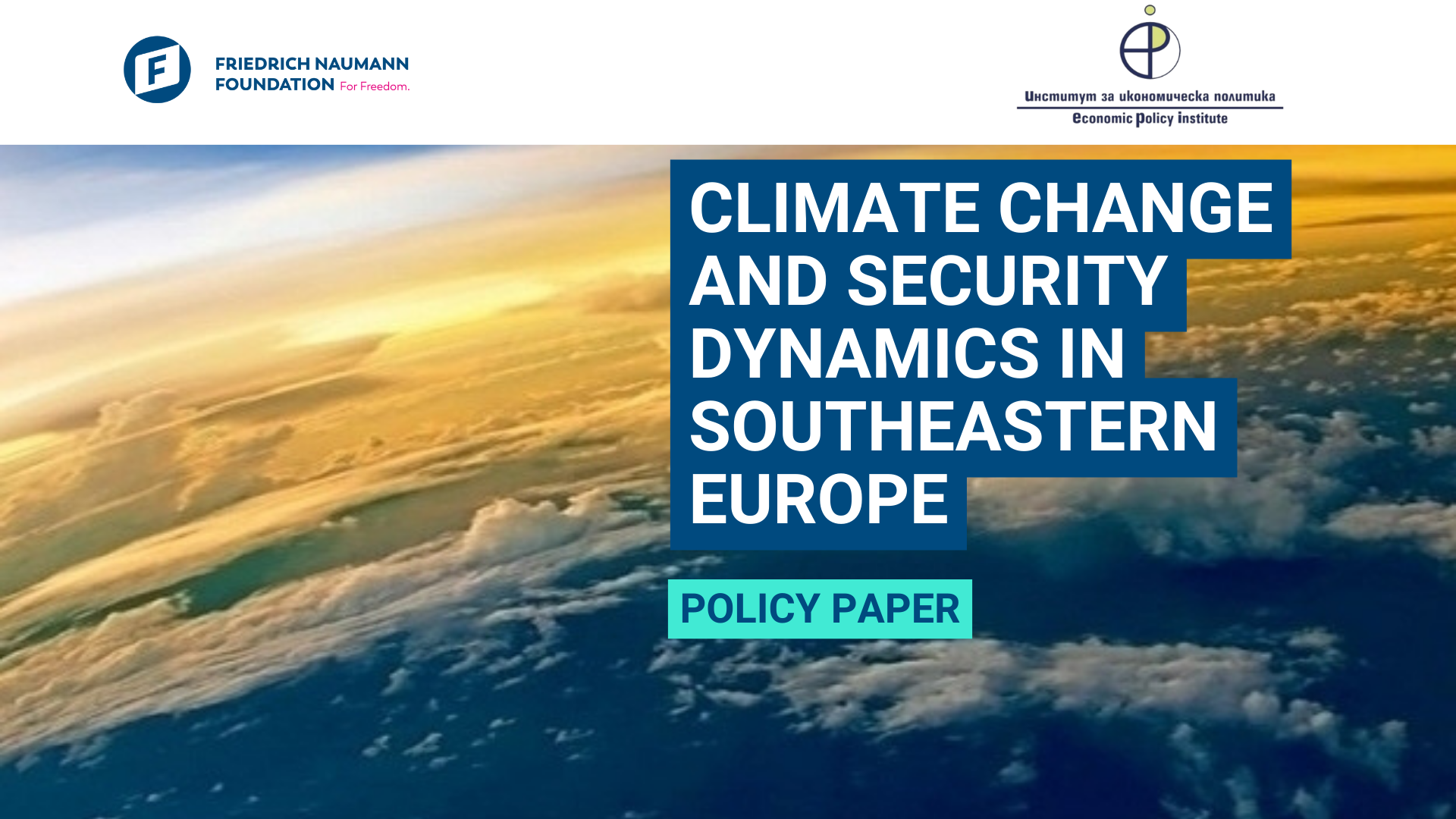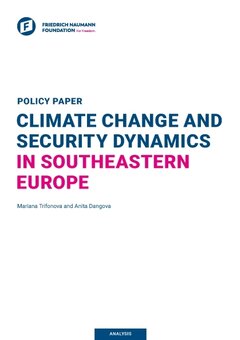Climate Change
How does Climate Change Reshape Security Policy?

Climate change has climbed to the forefront of public and political discourse across the globe. Yet, the direct impact of climate change for the security and defense sector remains a relatively new perspective among the broad spectrum of possible observing dimensions. In cooperation with the Friedrich Naumann Foundation for Freedom, the Economic Policy Institute - Sofia has produced a policy paper that focuses on this, so far rather neglected nexus, between climate change and security policy using the example of the region Southeast Europe. The authors Mariana Trifonova and Anita Dangova argue that climate-related risks not only pose new challenges but also aggravate existing threats to security. Given the relevance and value of the implications offered by the publication, the Regional Office of the Foundation for East and Southeast Europe hosted a special event dedicated to the paper. Participants were guided through the event by the author Mariana Trifonova who also briefly introduced them to the key points of the paper.
DOWNLOAD the POLICY PAPER below.
Southeast Europe increasingly affected by extreme weather events
Despite sub-regional variations in the specific effects, a clear increase in temperature is evident in the entire region of Southeast Europe. The average temperature in the Western Balkans has risen by 1.2 % in the last two decades alone, which has clearly resulted in more frequent extreme weather events. Floods, droughts and forest fires, along with various other natural disasters, are the major hazards that plague the region. The resulting challenge for all public systems charged with crisis response and the protection of civilians is inevitably a task that also falls into the hands of the local military. The increasingly extreme conditions in which they operate require new innovative training structures in the field of disaster relief. The growing role of the defense apparatus in rescue missions and damage recovery in the wake of climate-related disasters needs to be given more emphasis. States are urged to realign their defense policies so that the defense sector more broadly integrates preparedness for these growing volumes of non-weapon based crises into its long-term planning.
The decline of hydropower potential
Linked to this is also the existential issue of energy security. Many Balkan states have so far built too much on the utilization of hydropower in their energy agendas, even though the high water demand for this form of energy production often can't be met due to persistent droughts. The operation of nuclear power plants that are cooled by nearby sources of water also becomes a problem. Regardless of whether it is due to corruption, poor planning or simply a lack of financial capacity, the often old and dilapidated infrastructure is an additional major handicap for any kind of crisis management. Four experts from politics, science and business who also contributed to the publication enriched the discussion with short impressions from their respective home countries. Senior Associate at the Energy Policy Group Andrei Covatariu sees energy supply as a major climate-induced security risk for Romania. An intensive expansion of solar and wind power plants would be necessary due to the high failure risk of hydropower, despite the high resource costs involved. Dr. Nenad Stekić from the Institute of International Politics and Economics in Serbia also sees energy security as the greatest challenge for his country. The potential humanitarian crisis due to severe climate events could be compounded by violent riots and protests against the government in charge. A third of all Albanians live in the immediate vicinity of the Adriatic Sea and therefore are directly exposed to flooding. As a result, the population is moving abroad and the tourism sector, which is otherwise so valuable, is suffering financial damage. According to Lira Hakani of the Environmental Center for Development Education and Networking in Albania, this in turn is destabilizing society and the economy as well as endangering security in the country as a whole. Moreover, Albania is a country that derives its own energy production almost exclusively from hydropower. Even now, the volume produced is no longer sufficient and large amounts of energy have to be imported from abroad. A negative trend that will only worsen in the future and make the country more vulnerable with increasing external dependency, unless a systematic shift in energy security policy is made.

A Wake-Up Call for the member states of EU and NATO
Dr. Monika Panayotova, Assistant Professor, Department of International Relations, University of National and World Economy, Bulgaria, makes clear that climate change as a whole is an interdisciplinary polycrisis. She points out that economic and humanitarian problems because of climate change and environmental degradation can in turn culminate in armed conflicts. International resource disputes and national destabilization of the public order could be increasingly on the agenda in the future. In the face of the geographically close war in Ukraine, a large part of the Southeast European population does not perceive climate change as a security risk in the first place, but rather focuses on the omnipresent threat of damage from the aggressor Russia. However, the fight against climate change should not be a privilege of peacetime only. In order to prevent climate change from destabilizing the region of Southeast Europe, it is necessary that the EU becomes a real transformative power and tries to support the local forces in the best possible way to overcome the necessary obstacles.
Climate is a crisis multiplier
The Director of Sofia Security Forum Yordan Bozhilov also offered participants an additional take on how the current Russian war in Ukraine relates to the issue. He makes clear that a weaponized conflict itself is causing environmental damage as well, which, in combination with climate change, is amplifying the humanitarian crisis in a war region. Already now, it is no longer possible to avert economic, social and, above all, ecological damage that transcends the boundaries of generations. Air, water and land pollution already resulting in the degeneration of Ukrainian ecosystems. Soils are contaminated and will be infertile for years and forests are burning down. The local population is already being deprived of its livelihood. 73 known sea mines alone are currently floating along the embattled Ukrainian Black Sea coast, threatening to pollute maritime ecosystems with large quantities of pollutants through their destruction of combat and civilian ships. Missile strikes destroy buildings, vehicles, industry and warehouses, often resulting in the release of large quantities of toxic chemicals and pollutants. The unimaginable amounts of rubbish and scrap metal generated are impossible to dispose of properly. In addition, the asbestos in the buildings, which was much used in the Soviet era, are released through their destruction and will be responsible for illness and death in the long term, even if the weapons have long been put to rest.
This reality has to be confronted by geopolitical decision-makers and must be accompanied by a fundamental change of the very essence of how armed forces operate. Overall, climate change is a security challenge that requires a strategic rethink on the part of the EU and NATO.

